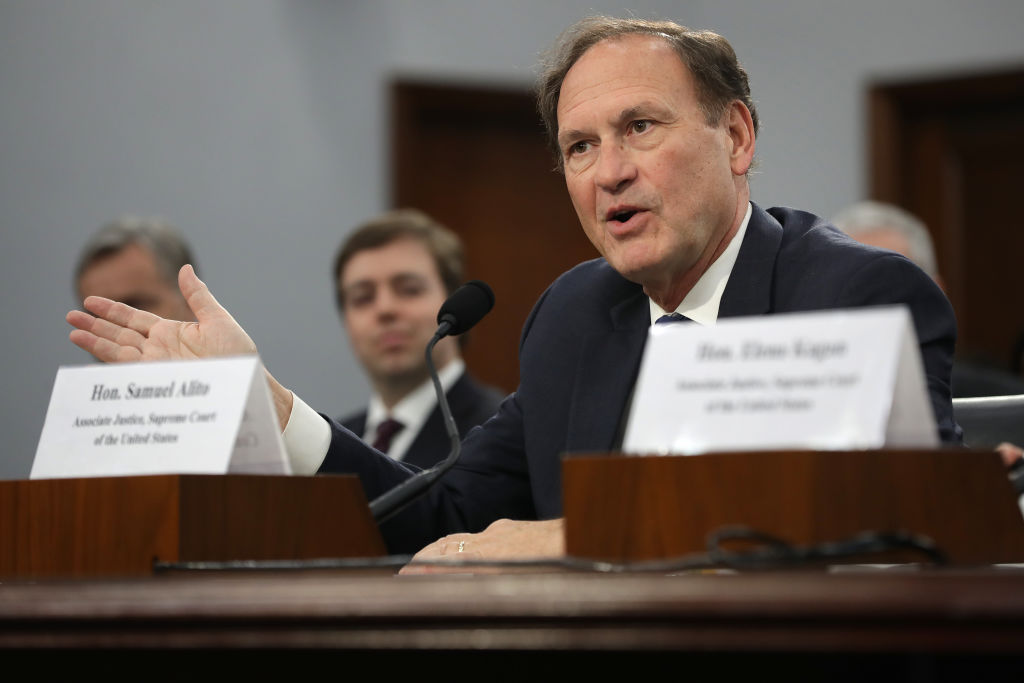The consummate statecraft of Justice Alito's leaked abortion opinion.
Common Good, Limited Government

How natural law limits state power.
In more recent years, many American conservatives have argued that the state—by which they primarily mean the federal government—must take on a more robust and directive role in many areas of social and economic policy where post-1980s conservatives had hitherto been reluctant to have government officials involved. Whether the topic is diminishing economic inequality or the availability of pornography, the language and logic of natural law philosophy and the idea of common good has been invoked by many self-described “common good conservatives” as the moral and political justification of the state’s responsibility to broaden and deepen its actions in these spheres of American life.
Natural law certainly affirms that there is such a thing as the common good. It also underscores that positive law and government have a role in shaping the moral, social, and economic order. At the same time, natural law maintains that there are principled limits to what the state can do vis-à-vis these areas. To grasp this point, it is important to understand how natural law delineates the nature of the specific common good for which the state is responsible.
Which Common Good?
Different forms of community gravitate around particular common goods. A synagogue or church, for instance, instantly actualizes the good of religion insofar as religion is understood as those beliefs and practices reflecting people’s conclusions about the ultimate truth about the origins of the universe, the purpose of human existence, and the meaning of these things for our choices and actions.
Other communities, however, do not instantiate a particular good like religion or truth. The political community (e.g., the United States, the State of Florida, the City of New York) is one such society. As far as political communities are concerned, the common good at stake is not a specific good like friendship or beauty. Instead, the political common good consists of those conditions within a given political community that tend to facilitate the coherent participation of its members in goods like truth, work, and beauty, which are self-evidently good for all humans. Some of these conditions can be found in the rights affirmed by natural law. Without some legal protection of rights like free speech, free association, economic freedom, and, above all, life, the scope for actively pursuing goods like truth, friendship, and creativity is radically diminished.
Other conditions of this political common good assume an institutional form. One example is the rule of law. Though it’s not impossible for people to be virtuous in the absence of the rule of law, it is much harder without it. Likewise, we know that the incentives for us to work are radically diminished if there is no guarantee that our earnings will not be arbitrarily confiscated by others or the state. Yet other ways in which a government promotes the political common good include, among others: interacting with other legitimate political authorities; protecting the members of the political community from hostile outsiders, vindicating justice by punishing wrongdoers; and defining and adjudicating the responsibilities associated with particular relationships (like contractual duties).
Note, however, that a particular characteristic of the political community’s common good is that it is not the all-inclusive end for its members. Rather it is instrumental. By this, I mean that it is directed to assisting the flourishing of persons by fostering the conditions that facilitate—as opposed to directly realizing—the free choice of its members to flourish. And helping individuals and associations in a given political community means precisely that: helping. The government does not assist individuals and communities by dulling, usurping, or annulling their ability and personal responsibility to make the free choices through which human flourishing is actualized.
In short, the activities and powers of the government are themselves limited by the rationale that gives rise to the need for government in the first place. This means that the goal of the political common good is not the all-round fulfillment of every member of that community. The political common good thus limits what state officials may do in a given political community, even when it involves moral goods and virtues that are universally beneficial to all people. Put another way: the law’s proper concern for justice and tranquility does not authorize the state to promote all acts of virtue and prohibit all vices. To this extent, natural law’s conception of the political common good puts principled constraints on using positive law to shape the free choices and actions of individuals and groups living within a given political community.
Living Subsidiarity
This does not exhaust the ways in which natural law restricts the scope of state power. Not only does the political common good limit what the state may do vis-à-vis individuals; it also constrains what the state may do concerning the freedom of the communities over which it exercises authority. One way of understanding this is through the natural law concept of subsidiarity.
The word itself is derived from the Latin subsidium, meaning to assist. The principle of subsidiarity reminds us that there are numerous free associations and communities which precede the state and establish many of the conditions that assist people to realize human flourishing. They thus have a primary responsibility to give others what they are objectively owed in justice. The way this works in practice was outlined by John Paul II in his 1991 encyclical Centesimus Annus. It states:
a community of a higher order should not interfere in the internal life of a community of a lower order, depriving the latter of its functions, but rather should support it in case of need and help to co-ordinate its activity with the activities of the rest of society, always with a view to the common good.
The same encyclical then clarifies that
Such supplementary interventions, which are justified by urgent reasons touching the common good, must be as brief as possible, so as to avoid removing permanently from society and business systems the functions which are properly theirs, and so as to avoid enlarging excessively the sphere of State intervention to the detriment of both economic and civil freedom.
Subsidiarity thus combines axioms of non-interference and assistance. It follows that when a case of assistance and co-ordination through law or the government proves necessary, as much respect as possible should be accorded to the rightful liberties and ongoing responsibilities of the assisted person or community.
The primary significance of this principle consequently lies in the fact that such freedoms are essential if people are to choose freely moral goods and virtues: i.e., through acting and doing things for ourselves, as the fruit of our own reflection, choices, and acts. That doesn’t mean that the state must refrain from, say, discouraging practices like prostitution. Nor does it suggest that the state should decline to punish those who freely choose to kill innocent people, steal other people’s property, torture individuals, or lie under oath. Subsidiarity simply means that the state must allow other communities to fulfill their own responsibilities, and intervene in the life of such associations only when it is plain that they are failing or unable to carry out their proper functions.
No Exceptions
There is, however, another way in which natural law limits the scope of government action. This concerns natural law’s affirmation that there are certain acts which in themselves may never be freely chosen, regardless of the circumstances or the nobility of the intention, because such actions are always seriously wrong —intrinsically evil (intrinsece malum), as they are called in natural law parlance—by reason of their object: i.e., what we are choosing to do.
An example of what natural law scholars call an exceptionless norm is the direct killing of an innocent person: in other words, directly choosing to violate the fundamental good of life. Even if an act of directly killing an innocent person might save an entire city from destruction, such an act remains intrinsically wrong by reason of its object. It is always irreconcilable with the choice of the good. There is never a good reason to make murder the deliberate object of our act. It follows that, in accordance with the central natural law principle that good is to be done and evil avoided, such an act can never be freely chosen. There are no exceptions.
These exceptionless moral norms closely track the second tablet of the Decalogue: don’t kill, don’t steal, don’t lie (especially under oath), etc. From a natural law standpoint, there is never a good reason to violate any of these absolutes—period. Thomas Aquinas put it this way: “Let us say that someone robs in order to feed the poor: in this case, even though the intention is good, the uprightness of the will is lacking. Consequently, no evil done with a good intention can be excused.” For what is being willed is theft, and all theft is always wrong, no matter what the circumstances may be.
The significance of this point for state power is that these moral absolutes do not simply bind individuals, families, and the communities and associations that make up civil society. Governments are also bound by the same limits. That means that the state may not, for instance, intentionally kill innocent people, steal the property of those living under its jurisdiction, enslave or torture people, deny them due process of just law, lie to the public, etc. A moment’s reflection on this point soon makes us realize that, absent recognition of such intrinsic restraints upon government action, the road is open to tyranny and the rule of men rather than of law.
The framework outlined above does not provide us with instant answers to questions such as whether the government should provide a comprehensive healthcare service, impose tariffs on steel imports, or ban prostitution. It does, however, suggest that those conservatives presently invoking natural law and the language of the common good to explain their commitment to ever bigger government should recognize that the natural law tradition—especially since it achieved a type of apotheosis in the writings of Aquinas—has long emphasized principled limits on state power and in no way provides a rationale for its endless expansion.
Certainly the political common good embraces a wide range of important conditions that help to facilitate human flourishing. Nonetheless, its instrumental character also means that the state cannot take over the initiation, development and maturing of all those relationships and endeavors through which individuals, families, and other communities fulfill their commitments to each other and actualize the basic moral goods that allow us to flourish.
The American Mind presents a range of perspectives. Views are writers’ own and do not necessarily represent those of The Claremont Institute.
The American Mind is a publication of the Claremont Institute, a non-profit 501(c)(3) organization, dedicated to restoring the principles of the American Founding to their rightful, preeminent authority in our national life. Interested in supporting our work? Gifts to the Claremont Institute are tax-deductible.
After Roe, America will face a fundamental question.
The Constitution cannot, and should not, be twisted to favor abortion.



